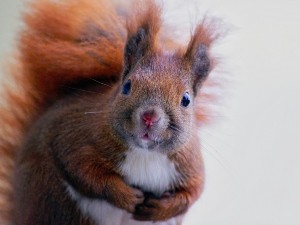
Warm-blooded animals are animals that can maintain a certain body temperature regardless of the temperature of their surroundings. Mammals and birds are known to be warm-blooded but it isn’t always that cut and dry, some mammals are cold-blooded. So, are squirrels warm-blooded? This article looks into it. Whether you’re a squirrel enthusiast or are simply curious, this article is for you.
Squirrels are one of the wonders of nature, they are neither cold nor warm-blooded they are in the middle, squirrels are classified as being heterothermic. This is contrary to the belief that all mammals are simply warm-blooded. Squirrels regulate their body temperature when needed to make themselves more comfortable.
Table of Contents
Are squirrels warm-blooded?
Wildlife professionals and scientists have classified squirrels as being heterothermic, meaning that they are able to regulate between being a cold and warm-blooded animal. A general rule of thumb is that mammals are warm-blooded. However, this rule of thumb is contradicted when looking at some species of squirrels.
For example, the artic squirrel can live in below-freezing conditions for months at a time. These squirrels can thermoregulate their body temperature down to a low as -29 degrees Celsius or 26.78 degrees Fahrenheit. Regulating body temperature is a trait of cold-blooded animals.
Squirrels can use their extremely sensitive teeth to gauge weather conditions and use their tails to greatly raise or lower their body temperature. They are even able to slow or raise their heart rate and breathing to meet the levels needed to survive in different temperatures. This ability allows squirrels to survive in the hottest and coldest parts of the world.
What is the body temperature of a squirrel?
On average, a squirrel maintains a body temperature of 99 – 101 Fahrenheit or 37.4 – 38.5 degrees Celsius. So, to be able to lower their body temperature below freezing point on their own is simply amazing.
Do squirrels get cold?
So, now that we know that these animals have the ability to regulate their body heat, can squirrels get cold? The answer is yes, they do feel cold, but don’t react as most animals or mammals do.
Squirrels will notice the drop or spike in weather conditions and adjust to compensate. So, for an instant, they will feel the cold but not for too long. Also, squirrels tend to huddle in their nest like homes (called dreys) as well as in holes in trees. That way they share their combined body temperature making them even more durable in icy weather conditions.
How do squirrels live through winter?
During winter, squirrels huddle together to endure the cold conditions. When out solo and when digging up their buried treasure troves of nuts, they thermo-regulate their body temperature to compensate for the weather.
It’s often in these icy cold conditions that squirrels raid trash cans and prey on insects, bugs, and roadkill, especially if the snow on the ground is too thick for accessing their buried treasures.
Can a squirrel freeze to death?
While it’s not impossible for a squirrel to freeze to death under the most severe cold conditions, the reported occurrence of this ever happening is rare to none.
Not only can squirrels thermo-regulate, they huddle to share warmth. They also eat a lot before the winter seasons to bulk up on fat and, they have furry coats that keep them warm in below-freezing conditions. For a squirrel to freeze to death they would need to be trapped out in the open for continuous hours of below freezing point temperatures.
Conclusion
Squirrels are one of the wonders of nature, they are neither cold nor warm-blooded they are in the middle, squirrels are classified as being heterothermic. This is contrary to the belief that all mammals are simply warm-blooded. These small rodents will regulate their body temperature when needed to make themselves more comfortable.
The body temperature of a squirrel is 99 – 101 Fahrenheit or 37.4 – 38.5 degrees Celsius and they do get cold and can freeze to death. In winter they regulate their body temperature, use their fur coat and bulk up on fat to stay warm in winter as well.
If you enjoyed this article then you may also be interested in other squirrel related articles. Here are some articles that you may be interested in: Do cats eat squirrels?, Why do squirrels nip off branches?, How to entertain squirrels?, Do squirrels eat frogs? Why do squirrels chatter their teeth?

